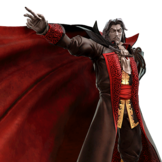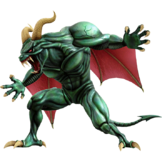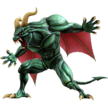Dracula
| Dracula Vlad Ţepeş | |
|---|---|
File:Dracula Spirit.png Official artwork of Dracula from Castlevania: Symphony of the Night. | |
| A boss in | Ultimate |
| Universe | Castlevania |
| Console of origin | Nintendo Entertainment System (Famicom Disk System) |
| Article on Wikipedia | Dracula Vlad Ţepeş |
Dracula (ドラキュラ, Dracula), full title Count Dracula Vlad Ţepeş (ドラキュラ・ヴラド・ツェペシュ伯爵, Count Dracula Vlad Tepes) is the main antagonist of the Castlevania franchise. He is loosely based on the historical figure Vlad the Impaler, as well as the titular antagonist in the Bram Stoker novel Dracula.
Origin
Dracula is a vampire who serves as the dark lord of a haunted castle in Transylvania, commanding an army of monsters to this end. He has a variety of magic at his disposal, such as teleportation, conjuring projectiles, and transforming into different beasts, which frequently occurs as he nears defeat. He is primarily opposed by the Belmont clan of vampire hunters. Though the Belmonts and other heroes repeatedly kill him, Dracula typically revives alongside his castle once every century, though his followers have also resurrected him prematurely.
Although Dracula debuted in the original Castlevania, his origins lie in Castlevania: Lament of Innocence, where he was once a Crusader and partner to Leon Belmont named Mathias Cronqvist. However, upon the sudden passing of his wife Elisabetha, Cronqvist became filled with anger and hatred, declaring war on God. In 1094, Cronqvist takes control of the Crimson Stone and becomes a vampire, eventually changing his name to Dracula Vlad Ţepeş. Dracula later ended his war against God in 1455 when he met, and eventually married, a human woman named Lisa. Together, they bore a son named Adrian. In 1475, Lisa was executed following accusations of witchcraft, and Dracula declared war against humanity as a result. Adrian, who was present at the execution, was told to deliver Lisa's final words to his father. However, he finds himself unable to reason with him, so he turned against his father and changed his name to Alucard. A year later, Dracula was defeated by Trevor Belmont, Alucard, and their companions Sypha Belnades and Grant Danasty.
Nearly two hundred years later, Dracula returns from the grave but is defeated by Trevor's descendant, Simon Belmont. In his dying breath, Dracula set a curse on Simon that slowly killed him from the inside, which was undone by reviving Dracula and destroying him once more. A century later, Dracula is revived twice by the Dark Priest, Shaft, but is defeated first by Richter Belmont, then by Alucard five years later, who tells him the last words of his wife: "Do not hate humans. If you cannot live with them, then at least do them no harm, for theirs is already a hard lot." Dracula asks for Lisa's forgiveness as he fades away, bidding his son farewell.
Across the 19th century, Dracula would see himself resurrected by his minions and humans are drawn to his power. However, the Belmont clan was unable to fight back, as a prophecy had prohibited them from touching the Vampire Killer, the holy whip created by Leon until the appointed time had come. Other hunters would take their place, including Shanoa, Nathan Graves, Reinhardt Schneider, and the Morris clan; Quincey, John, and Jonathan. After resurrections in both World Wars, the final battle against Dracula ensued in 1999, where he was permanently destroyed by Julius Belmont, Alucard, and their allies. Portions of his power were passed down to those who were born on the day of his death, and Dracula himself reincarnated as Soma Cruz in 2017. Soma learned of this when the castle manifested in a solar eclipse over Japan in 2035, but he resisted Dracula's influence, telling Julius to kill him should he become the evil count. One year later, Soma stopped a cult that sought to resurrect Dracula through those who had inherited portions of his power. An alternate, non-canon scenario depicts a corrupted Soma transforming into a reincarnation of Dracula, forcing Julius, Yoko Belnades, and Alucard to defeat him.
Since the original Castlevania, Dracula transforms into his second form when his life bar is depleted. The shape his second form takes varies by game: examples include a giant bat, a giant head, a demon, or simply his humanoid form with enhanced abilities.
Dracula has even made a few playable appearances, such as in the fighting game spin-off, Castlevania Judgment. His reincarnation, Soma Cruz, is the protagonist of Castlevania: Aria of Sorrow and Dawn of Sorrow, and is also playable in Harmony of Despair. In the rebooted Lords of Shadow series, protagonist Gabriel Belmont becomes a vampire and comes to be known as Dracula.
In Super Smash Bros. Ultimate
As a stage element
Dracula appears as a background character on Dracula's Castle. When the moon disappears and bats gather around Dracula's coffin, lightning will flash and reveal Dracula's shadow in one of the windows.
As a boss
The fighters that are assigned to fight Dracula in Classic Mode are Luigi, Pac-Man, Simon, and Richter. Dracula appears as a boss in Classic Mode and Adventure Mode: World of Light. In World of Light, he is fought at the end of the Dracula's Castle dungeon in the Dark Realm, and must be defeated before the player may challenge Dharkon. He reappears during the Final Battle as part of the boss rush leading up to the Galeem and Dharkon fight. He does battle on a stage resembling the Dracula's Castle stage, but with a flat and empty layout that extends to the side blast zones. Nothing to Lose usually plays during the fight in the first form, which will change to Black Night when he changes to his demon form, but Dwelling of Doom plays in Pac-Man's Classic Mode, Dance of Illusions in Richter's Classic Mode, and Galeem / Dharkon during the boss rush.
Defeating Dracula in Classic Mode is a challenge, which unlocks the Black Night music track. Defeating Dracula in the Dracula's Castle dungeon in World of Light rewards the player with the Dracula and Dracula (2nd Form) spirits.
Dracula begins the fight in his regular humanoid form, based on Ayami Kojima's artwork for Castlevania: Symphony of the Night. The battle opens with Dracula on his throne holding a glass, which he tosses aside as he gets up, then warps onto the stage to start the fight. Like in his own series, Dracula moves about the stage by teleporting in a beam of light. Dracula only takes damage when hit in the head, which has traditionally been his weak point since his first appearance. Attacking any other part of his body creates a small mist effect, which resembles Alucard's mist transformation.
When his health bar is depleted, Dracula will transform into a large winged demon, as depicted in Castlevania: Rondo of Blood. His health is fully restored, and he uses an entirely different set of attacks. Unlike his first form, Dracula's second form may be damaged by hitting any part of his body and will walk and jump instead of warping to move.
Moveset
First form
| Move | Damage | Description |
|---|---|---|
| Hellfire | Dracula takes a step back and wraps himself in his cape, then flings it open to launch a spread of three fireballs forward. This first appeared in the original Castlevania. | |
| Dark Inferno | Dracula takes a step back, then holds out his arm as he launches a series of large dark fireballs forward. The fireballs alternate between being just above the ground and at about Dracula's height, which is high enough to miss short or crouching characters. This originates from Castlevania: Rondo of Blood. | |
| Magic orbs | Dracula wraps himself in his cape, then flings it open and holds his arm out to his side, launching multiple sets of red and blue magic orbs. These orbs either revolve around him with sets flying in an alternating clockwise and counter-clockwise fashion as they spread outward, or fly straight with sets alternating between all cardinal and diagonal directions. The red orbs are more powerful than the blue ones, but both types can be absorbed. This move resembles one used by Graham Jones in Castlevania: Aria of Sorrow, which used Dark Inferno's fireballs instead of orbs. | |
| Fire pillars | Dracula raises his arm, and harmless flames appear on the ground, either with many appearing at once or in a sequence. After a moment, these flames erupt into tall fire pillars that hit multiple times. At low health, he combines it with one of the above three moves. It resembles a combination of his primary attack in Castlevania III: Dracula's Curse, Dario's fire pillars in Castlevania: Dawn of Sorrow, and one of his attacks in Castlevania: Harmony of Despair. | |
| Bat Moon | Dracula thrusts his cape upwards, then transforms into a swarm of bats and rushes ahead to deal darkness damage. This originates from Castlevania: Portrait of Ruin. Some characters, like Squirtle, can crouch underneath this attack to dodge. |
Second form
| Move | Damage | Description |
|---|---|---|
| Ghost Chaser | Dracula spits a series of three spirits, which initially float up in front of him before flying towards the player's current location. These spirits disappear upon reaching their destination, and they may inflict the poison status upon hitting players. It originates from Portrait of Ruin. | |
| Fire burst | Dracula charges up, then spits a widespread of three fireballs aimed at the player, which explode on contact. It originates from his triple fireball attack in Castlevania. | |
| Electric wave | Dracula charges up, then spits an electric wave forward, which is nearly as tall as him. This was one of his primary attacks in Rondo of Blood. Despite its appearance, it actually deals aura damage. | |
| Claw swipe | Dracula swipes in front of him with his claws. He may either perform it in place or while taking a step forward. This attack may inflict the poison status. | |
| Claw combo | Dracula performs a series of three claw swipes while stepping forward with each swing. The final swipe deals darkness damage. | |
| Dark claw | Dracula does a wide overhead swing with his claws, which deals darkness damage and can meteor smash. He may either rear back and perform it in place or take a step forward. | |
| Jumping slam | Dracula jumps to a different spot on the stage. His landing deals damage. | |
| Shockwave punch | Dracula jumps, then slams his fist into the ground, producing a shockwave that moves to both ends of the stage. The initial jump, falling punch, and shockwave all deal damage. |
Spirits
Gallery
Dracula's appearance in Super Smash Bros. Ultimate.
Dracula's shadow as seen in the Dracula's Castle stage.
Trivia
- Dracula casts a shadow in the Dracula's Castle stage, despite vampires traditionally being unable to cast shadows, as they lack a soul.
- This could be a reference to the 1992 film Bram Stoker's Dracula, where Dracula has a living shadow in his form.
- Dracula and Rathalos are the only third-party bosses in Adventure Mode: World of Light.
- Dracula's glass-throwing entrance as a boss references his introduction in Castlevania Chronicles, where he does so after sipping blood from it. This is also seen in its more well-known iteration in the opening sequence of Symphony of the Night.
External Link
- Article on the Castlevania Wiki.
| Bosses | |
|---|---|
| Super Smash Bros. | Master Hand · Metal Mario · Giant Donkey Kong · Fighting Polygon Team |
| Melee | Master Hand · Crazy Hand · Giga Bowser · Fighting Wire Frames (Male · Female) |
| Brawl | Master Hand · Crazy Hand · Petey Piranha · Rayquaza · Porky · Galleom · Ridley · Duon · Meta Ridley · Tabuu · Fighting Alloy Team (Red · Blue · Yellow · Green) · False characters |
| Smash 4 | Master Hand · Crazy Hand · Master Core · Fighting Mii Team |
| Ultimate | Master Hand · Crazy Hand · Rathalos · Galleom · Giga Bowser · Galeem · Dharkon · Dracula · Ganon · Marx · Fighting Mii Team · False characters |
|
| |
|---|---|
| Fighters | Simon (SSBU) · Richter (SSBU) |
| Assist Trophy | Alucard |
| Boss | Dracula |
| Stage | Dracula's Castle |
| Item | Death's Scythe |
| Other | Dracula's Castle |
| Spirits | Spirits |
| Music | Ultimate |




















